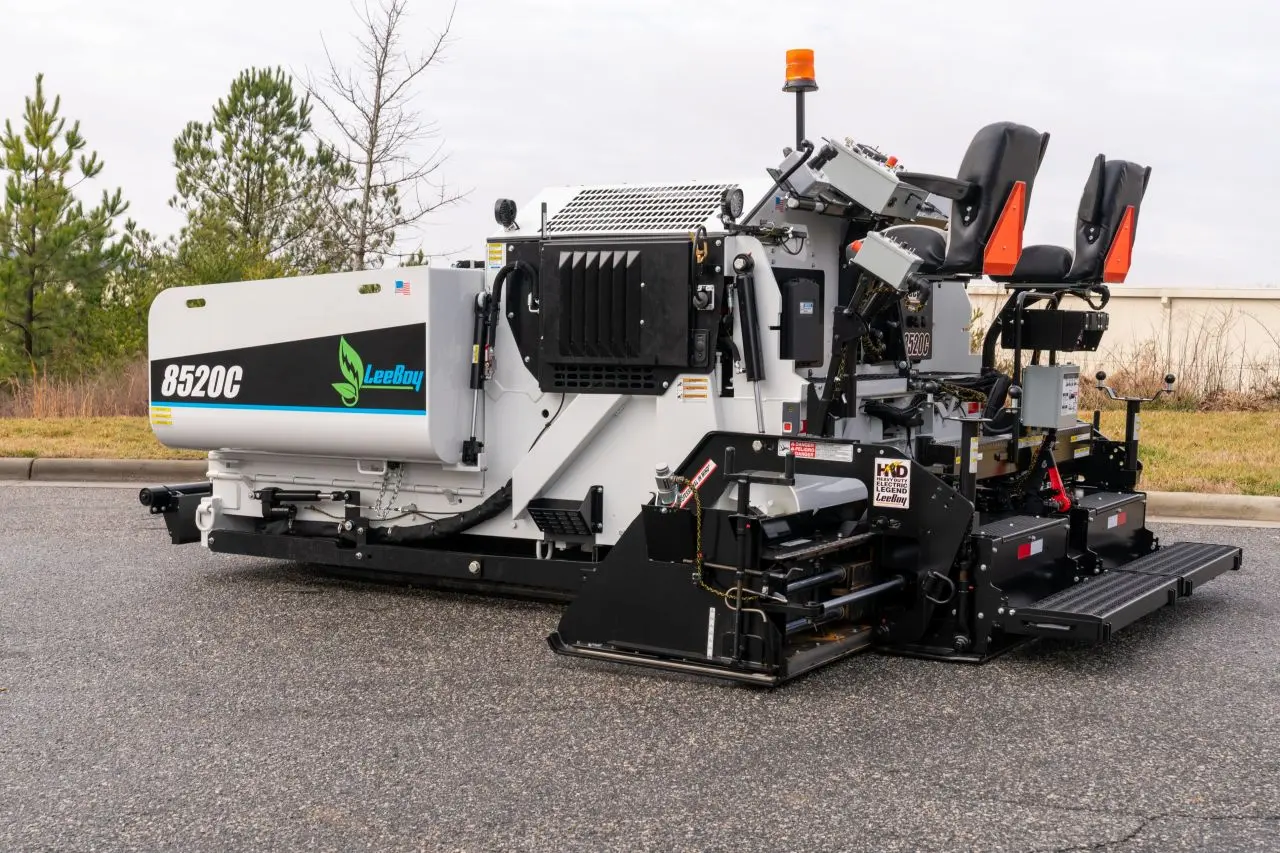When choosing between traditional and electric asphalt pavers, keep your project and environmental priorities in mind.
Traditional pavers are fueled by diesel, robust, and reliable for large-scale projects, but they do rack up higher fuel and maintenance costs.
On the flip side, electric pavers operate cleaner and quieter, greatly reducing emissions and maintenance expenses over time.
Though they have a higher initial cost, they are better for smaller projects or areas with strict emission regulations. Depending on your needs and the scale of your projects, both options have distinct advantages.
There’s more to uncover that could sway your decision.
Overview of Asphalt Pavers
Asphalt pavers, the backbone of road construction, swiftly lay down roads and surfaces, transforming raw materials into smooth, durable paths. You might not think about them often, but these machines are essential for creating the roads you drive on every day. Imagine them as large, moving factories on wheels that heat, mix, and then lay asphalt precisely where it’s needed. They guarantee that the material is evenly distributed and compacted to withstand years of traffic and weather.
These pavers come in various sizes and configurations, depending on the project’s demands. You’ll find smaller models for tight spaces and massive ones that can cover an entire highway lane in one pass. They’re equipped with advanced technology to monitor everything from the amount of material used to the temperature of the asphalt. This attention to detail ensures that each road meets strict standards for quality and safety.
Moreover, modern pavers are designed to be more environmentally friendly. They feature innovations that reduce emissions and improve energy efficiency, aligning with global efforts to combat climate change. As you drive along smoothly paved roads, remember, it’s the sophisticated engineering of asphalt pavers that makes your journey smooth and safe.
Traditional Pavers: Basics
While modern pavers emphasize sustainability, traditional pavers have set the standard for reliability and efficiency in road construction. You’ll find that these machines, typically powered by diesel engines, are robust and capable of handling a wide range of paving projects, from small paths to extensive highways.
Traditional pavers rely on hydraulic systems to operate their moving parts, including the conveyor belts that transport the asphalt to the screed at the back of the machine. This screed then spreads and pre-compacts the asphalt. You have the ability to adjust the thickness and width of the asphalt application, which is important for meeting specific project standards.
What’s more, you’re likely familiar with the durability of these machines. Traditional pavers are built to last and handle tough conditions, which is why they’re a common sight at construction sites. Their operational longevity means you can use them for years before needing major overhauls, provided they’re well-maintained.
However, keep in mind the operational costs associated with fuel consumption and emissions. While they’re not the most eco-friendly option available today, their performance and dependability continue to make them a viable choice for many contractors. As you weigh your options, consider how these factors align with your project needs and values.
Electric Pavers: Basics
Electric pavers represent a groundbreaking shift towards sustainability in road construction. As you explore the world of asphalt paving, you’ll find that electric pavers are more than just an eco-friendly alternative; they’re a demonstration of modern engineering aimed at reducing the carbon footprint of construction activities.
Firstly, electric pavers are powered by batteries or electric power sources, eliminating the need for diesel and greatly reducing emissions. This means you’re not only contributing to a cleaner environment but also complying with increasingly stringent environmental regulations. You’ll appreciate that these machines operate much quieter than their traditional counterparts, which is a huge plus for urban projects or night-time construction without disturbing local communities.
Moreover, the design of electric pavers often integrates advanced technology for enhanced operation. Features like automatic temperature control and real-time tracking systems streamline the paving process and improve the precision of the job. You’ll find these pavers equipped with user-friendly interfaces that facilitate easier management and operation, making your job smoother and more efficient.
Choosing an electric paver doesn’t just reflect a commitment to environmental responsibility; it also means embracing advanced technology for better results in your paving projects.
Performance Analysis
Let’s explore how traditional and electric pavers compare in terms of performance. When you’re dealing with traditional asphalt pavers, you’re tapping into a well-established technology. These machines typically offer robust power and the capacity to handle large-scale projects. They’re designed to push through important, long hours on the job, which is essential when you’ve got extensive roadworks.
On the other hand, electric asphalt pavers bring a whole new level of efficiency to the table. They’re quieter, which is a big plus if you’re working in urban areas or near residential zones where noise pollution is a concern. You’ll also find that these electric models are smoother in operation, thanks to their consistent power delivery. This can lead to better quality paving with fewer passes required.
Moreover, electric pavers produce zero emissions at the point of use. This isn’t just good for the environment; it also improves the working conditions on site. Without diesel fumes clouding the area, it’s a healthier workspace for your crew.
However, it’s important to think about that while electric pavers offer these benefits, their initial performance in rugged conditions might not be as reliable as traditional models. They are improving steadily, but the toughest jobs might still call for the sheer grunt of diesel.
Cost Comparison
When contrasting the costs of traditional and electric asphalt pavers, you’ll find that the initial investment differs greatly. Traditional pavers generally come at a lower purchase price compared to their electric counterparts. However, don’t let the initial cost fool you; there’s more to take into account when deciding which paver meets your needs and budget in the long run.
Here’s a quick breakdown of cost-related factors:
- Initial Purchase Price: Electric pavers typically cost more upfront. This is due to the advanced technology and components used in these machines.
- Maintenance Expenses: You’ll usually spend less on maintaining an electric paver. They have fewer mechanical parts than traditional pavers, which means fewer components to repair or replace.
- Fuel Costs: Operating costs can be considerably lower for electric pavers as they don’t require diesel. The savings on fuel can be substantial, especially over the lifetime of the paver.
While the sticker price on electric models might give you pause, consider the long-term savings you could achieve. You’ll need to weigh these ongoing operational costs against the initial expense to truly determine which type of paver makes the most economic sense for you. Remember, the right choice depends not just on the purchase price, but also on the cost of keeping your paver running smoothly.
Environmental Impact
Beyond cost factors, the environmental impact of your choice between traditional and electric asphalt pavers is substantial. Traditional pavers, which typically run on diesel, emit a considerable amount of CO2 and other harmful pollutants that contribute to air pollution and climate change. In contrast, electric pavers offer a greener alternative, producing zero emissions at the point of use. This stark difference can help you greatly reduce your carbon footprint.
You’ll also find that electric pavers are quieter, which means less noise pollution—a real benefit in urban or residential areas. The reduction in noise can lead to a more pleasant and less disruptive construction environment, not just for workers but also for the surrounding community.
Another point to take into account is the broader energy source. While electric pavers themselves don’t emit pollutants, the source of their electricity might. If the electricity comes from coal or natural gas, some emissions are still indirectly linked to their use. However, if the source is renewable energy, like solar or wind, the environmental benefits increase substantially.
Choosing electric asphalt pavers isn’t just about adhering to stricter environmental regulations; it’s about actively contributing to a sustainable future. Your choice can drive demand for cleaner technology, pushing the industry towards more innovative solutions.
Maintenance and Durability
While considering the environmental benefits of electric asphalt pavers, you should also evaluate their maintenance needs and durability. Electric pavers typically have fewer moving parts compared to traditional diesel pavers. This means you’ll deal with fewer mechanical issues over time. However, the battery systems and electric motors do require specific expertise and regular checks to make sure they remain in top condition.
Traditional pavers, on the other hand, are well-known for their robustness and have been perfected over decades. The familiarity of their technology makes it easier for you to find service and parts. Yet, they demand regular maintenance like oil changes, filter replacements, and attention to their combustion engines, which can add up in costs and downtime.
Consider these maintenance and durability aspects:
- Parts Availability: Traditional pavers generally have more readily available parts compared to newer electric models.
- Servicing Needs: Electric pavers require specialized technicians for electrical components, whereas traditional models can often be serviced by a broader range of mechanics.
- Longevity and Wear: Diesel engines in traditional pavers are susceptible to wear from dirt and grime, whereas electric pavers are less affected by such environmental factors.
Balancing these considerations will help you make an informed decision tailored to your operational needs.
Industry Adoption Trends
You’re seeing a notable shift in the industry as more companies opt for electric pavers over traditional models. This trend highlights a decrease in the popularity of traditional pavers, signaling potential long-term changes in how roads and pavements are constructed. As you consider these shifts, it’s essential to understand the factors driving this move towards electric technology.
Shift Towards Electric Pavers
Many industries are now embracing electric pavers due to their environmental benefits and cost-effectiveness. You’ll see a significant shift as companies aim to meet stricter emission standards and reduce their carbon footprint. This move not only helps in adhering to global sustainability goals but also improves your company’s public image. As you consider moving towards electric pavers, it’s important to understand the changing landscape.
- Lower Operating Costs: Electric pavers offer reduced fuel expenses and maintenance costs.
- Government Incentives: Various subsidies and tax breaks make electric pavers more attractive.
- Technological Advancements: Enhanced efficiency and precision in paving operations with newer electric models.
These trends are reshaping how projects are approached, ensuring you’re not left behind in adopting smarter, greener technologies.
Traditional Paver Popularity Decline
As industries increasingly adopt electric pavers, the popularity of traditional asphalt pavers has begun to wane. You’re seeing a shift where the environmental and operational advantages of electric models are outshining the older, diesel-powered versions. They’re not only quieter and cleaner but also more cost-effective in the long run when you factor in fuel savings and maintenance costs. This trend is reshaping how companies invest in their fleets, pushing more towards sustainability. It’s evident that the market is responding to global demands for greener construction practices. If you’re involved in procurement or operations, it’s essential to keep up with this shift. Ignoring it could leave you behind as the industry evolves.
Conclusion
As you stand at the crossroads of progress and tradition, consider the path that best suits your journey. Electric pavers, with their whisper of green promises, might initially tug harder on your wallet, but they dance lightly on the earth, leaving softer footprints behind. Traditional pavers, sturdy and time-tested, march reliably forward. Weigh your options, balance cost with environmental whispers, and choose the paver that not only paves your roads but also gently guides your conscience.











































